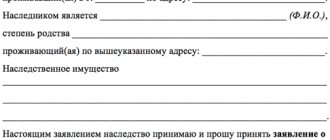What does the law say?
The central norm in this case is Article 57 of the Family Code of the Russian Federation:
The child has the right to express his opinion when resolving any issue in the family that affects his interests
and to be heard in any judicial or administrative proceedings.
Taking into account the opinion of a child who has reached the age of ten years
, is obligatory, except in cases where it is contrary to his interests.
In cases provided for by this Code (Articles 59, 72, 132, 134, 136, 143, 145), the guardianship and trusteeship authorities or the court can make a decision only with the consent of the child
who has reached the age of ten years.
The article is formulated in such a way that any child has the right to express his opinion, but if the child is under 10 years old, then the court, at its own discretion, can take this opinion into account or not.
RF IC, Article 57. The child’s right to express his opinion
The child has the right to express his opinion when deciding any issue in the family that affects his interests, as well as to be heard during any judicial or administrative proceedings. Taking into account the opinion of a child who has reached the age of ten is mandatory, except in cases where this is contrary to his interests. In cases provided for by this Code (Articles 59, 72, 132, 134, 136, 143, 145), the guardianship and trusteeship authorities or the court can make a decision only with the consent of a child who has reached the age of ten years.
Commentary on Article 57 of the RF IC
Article 57 of the RF IC, giving a child the right to express his opinion when deciding in the family any issue affecting his interests, as well as to be heard during any judicial or administrative proceedings, shows that, despite complete dependence on parents, limited legal capacity, he recognizes each child as a full member of our society and, although not yet fully formed, as a separate person deserving respect.
At first glance, the norm of the commented article looks contradictory, establishing that it is mandatory to take into account the opinion of a child who has reached the age of 10, except in cases where this conflicts with his interests. It would seem that an opinion is always a direct expression of an individual’s interests, and who else but the individual himself, the bearer of certain needs and interests, can know about his needs better than anyone else? However, in reality there is no contradiction here. Firstly, by granting a child with limited legal capacity from the age of 6 years, the state shows that it does not yet trust the child to make decisions independently and express them in actions that have legal significance. After all, legal capacity presupposes the ability to understand the meaning of one’s actions, manage them and foresee their consequences, which becomes possible, according to sociological and psychological research, only upon reaching 18 years of age.
Secondly, establishing the norm of Art. 56 of the RF IC, that it is the parents who express and protect the rights and legitimate interests of the child, the state also shows that it does not yet trust the child to independently carry out such actions and puts the opinion of the parents, in general, above the opinion of the child himself.
Thirdly, the state does not proceed from the abstract absolute of the interests of the child when protecting his interests, but from the priority for him of generally recognized benefits, such as health, a full-fledged education, psychological comfort and material well-being. And, as we all know, in childhood, concepts of good can be significantly distorted under the influence of momentary desires.
Thus, this norm makes it clear that the state provides the child with the right to vote and, if his interests coincide with those that are socially recognized and necessary for him, parents (or persons replacing them) are obliged to take them into account. However, the last word still remains with them if the desires expressed by the child, representing his personal interests, do not correspond to generally accepted benefits.
It should also be noted that the obligation to take into account the opinion does not mean that in controversial situations it is necessary to completely accept the child’s position. Taking into account opinions means that parents must, to one degree or another, adjust their position taking into account the child’s opinion, i.e. come to some kind of compromise.
However, despite the fact that the last word in general does not rest with the child, but only his opinion is taken into account, there are cases in which the word of the child, provided he reaches the age of 10 years, is decisive (Articles 59, 72, 132, 134 , 136, 143, 145 of the commented Law).
These are cases such as:
- changing the child's first and last name;
- restoration of parents' parental rights;
- consent of the adopted child to adoption;
- changing the surname, name and patronymic of the adopted child;
- registration of adoptive parents as parents of an adopted child;
- resolving the issue of preserving for the child the first name, patronymic and last name assigned to him in connection with his adoption when the adoption is cancelled;
- resolving the issue of placing a child under guardianship or trusteeship;
- appointment of a guardian for a child who has reached the age of 10 years.
Can a child choose who to live with?
After the divorce, my nine-year-old son remained to live with his ex-wife. This decision was made by us mutually. However, today she does not work, while I have all the means and opportunities to adequately provide for my child. Is it possible for my son to live with me now? Can he make his own choice?
Children can express their position regarding who they want to live with. Of course, this does not mean that the court will make a decision referring solely to the child’s opinion. For example, a child may claim that he wants to live with his dad, who is not particularly involved in his upbringing (does not force him to do homework, attend clubs, sections, allows him to walk a lot, etc.).
*1. A parent living separately from the child has the right to communicate with the child, participate in his upbringing and resolve issues regarding the child’s education. * The parent with whom the child lives should not interfere with the child’s communication with the other parent, if such communication does not harm the child’s physical and mental health, or his moral development.
*2.
Parents have the right to enter into a written agreement on the procedure for exercising parental rights by a parent living separately from the child.
*If the parents cannot come to an agreement,
the dispute is resolved by the court with the participation of the guardianship and trusteeship authority
at the request of the parents (one of them).
At the request of the parents (one of them) in the manner established by civil procedural legislation, the court, with the obligatory participation of the guardianship and trusteeship authority, has the right to determine the procedure for the exercise of parental rights for the period before the court decision enters into legal force. (as amended by Federal Law No. 98-FZ dated 04.05.2011) *3. In case of failure to comply with the court decision, measures provided for by civil procedural legislation are applied to the guilty parent. In case of malicious failure to comply with a court decision, the court, at the request of a parent living separately from the child, may make a decision to transfer the child to him based on the interests of the child and taking into account the opinion of the child.
*4. A parent living separately from the child has the right to receive information about his child from educational institutions, medical institutions, social welfare institutions and similar organizations. The provision of information may be refused only if there is a threat to the life and health of the child on the part of the parent. Refusal to provide information may be challenged in court. (as amended by Federal Law No. 49-FZ dated April 24, 2008)
Marilu
, follow the Family Code of the Russian Federation: Article 65. Exercise of parental rights **2.
All issues related to the upbringing and education of children are resolved by parents by mutual consent based on the interests of the children and taking into account the opinions of the children. Parents (one of them)
, if there are disagreements between them,
have the right to apply
for resolution of these disagreements
to the guardianship and trusteeship authority or to the court.
*3.
The place of residence of children in the event of separation of parents is established by agreement of the parents.
*In the absence of an agreement,
the dispute between parents is resolved by the court based on the interests of the children and taking into account the opinions of the children
. In this case, the court takes into account the child’s attachment to each of the parents, brothers and sisters, the child’s age, moral and other personal qualities of the parents, the relationship existing between each parent and the child, the possibility of creating conditions for the child’s upbringing and development (occupation, work schedule of the parents , financial and marital status of parents, etc.). *At the request of the parents (one of them) in the manner established by civil procedural legislation, and taking into account the requirements of paragraph two of this paragraph, the court, with the obligatory participation of the guardianship and trusteeship authority, has the right to determine the place of residence of children for the period before the court decision on their determination enters into legal force living place. (paragraph introduced by Federal Law dated 04.05.2011 N 98-FZ)
On what issues can a child express his or her position?
Judging by Art. 57 of the RF IC, a minor has every right to express his own position on any family issue that concerns his interests.
In addition, the child is required to be heard not only at the “family council”, but also in court. In this case, the type of proceedings does not matter - the opinion is taken into account both when parents divorce, and when restoring the rights of a parent, and when adopting.
However, the main issue, in the resolution of which the opinion of children is a significant factor, is still the determination of their place of residence.
How do courts apply the rule?
In judicial practice, there is an approach where a survey of a child under the age of 10 was conducted by employees of the guardianship and trusteeship authorities as part of an examination of living conditions and was reflected in the conclusion of the case.
1) Appeal ruling of the Moscow City Court dated March 10, 2015 in case No. 33-7216/2015; 2) Appeal ruling of the Moscow City Court dated November 14, 2017 in case No. 33-34754/2017
Since this procedure is not directly regulated for guardianship employees, there is a risk that the child may not be interviewed and his opinion may not be known.
How to interview a child under 10 years old?
If you want your child to express his opinion, you can submit a written request to the court. In this petition, ask the court to instruct guardianship officials to find out the child’s opinion regarding the subject of the dispute (place of residence, order of communication).
Recommendation. It is better to submit the petition as substantiated as possible, i.e. explain that the child, despite the fact that he has not yet reached 10 years of age, is well able to formulate his thoughts and is psychologically capable of answering such questions.
At what age does a child have the right to choose who he wants to live with - mom or dad?
The procedure for resolving disputes arising during the dissolution of a marriage relationship is determined by the Family Code of the Russian Federation. In accordance with Art. 54 of the RF IC, a child has the right to live together with his parents and the right to family upbringing. Upon termination of the marital relationship of the parents, in accordance with Art. 65 of the RF IC, it is necessary to determine the place of residence of the offspring. In the absence of an agreement between the mother and father, the court makes a decision for them, taking into account many circumstances, but the main criterion is the interests of the child.
The opinion of children is taken into account and, when resolving specific disputes, plays an important role, but not a decisive one, since the legislator takes into account that a child, due to his age, may not be aware of his interests and be under the influence of his parents. In this article, we will look at how old a child is to have the right to choose who he wants to live with when his parents divorce and whether he is even given such a right.
A PLO officer must be present at the trial, and even before the start, the judge is obliged to consult with him. This is necessary in order to make sure that the question of choosing a parent will not cause serious psychological trauma to the child. Children, due to their age, cannot understand why dad and mom should live separately; they do not know the difficulties in the relationship between parents, especially when they never argue (scandal) in the presence of children.
Thus, in addition to the age at which children’s opinions are taken into account when parents divorce , father and mother should take note that the court considers all circumstances comprehensively. Be sure to listen to the opinions of witnesses on both sides, read the conclusion of the PLO on the living conditions of the child. In cases where the forces are equal, it is the opinion of a child over 10 years old that can play a decisive role in making the final decision.
A teenager's opinion during a divorce
According to Article 57 of the RF IC, a child 10 years of age and older has the opportunity to express preferences regarding further residence. The child’s decision is usually based on the following features:
- Attachment to father or mother. The level of closeness of a minor with his parents is determined on the basis of an examination carried out by guardianship officials and teachers. Authorized persons study in detail the attitude of children towards each of the family members and identify sincere affection.
- Educational image of spouses. Gentleness and permissiveness, as a rule, are the determining factors for the baby. However, these same qualities directly violate the interests of the teenager, which means the judge will not take them into account.
Despite the fact that, by law, a minor has the right to express his own preferences, the court will not take them into account unless it is proven that the teenager’s choice coincides with his interests. In other words, if the minor chooses to stay with his father, and the court considers that the mother would be the best option, then the child will be left with her.
Is the child’s opinion taken into account during a divorce through the registry office?
According to the norms of the RF IC, divorce in the registry office is possible only in the absence of children. Even if the spouses have no disputes, but there is a minor child, you need to go to court.
Another situation is possible - creating a family with a parent who has a child from a previous marriage. In fact, a spouse who is not biologically related to him has no rights to him (except for subsequent adoption). In this case, the opinion of the minor will not be taken into account in court, and the place of residence will not have to be determined - he will remain with his natural mother or father, even if he is strongly attached to his wife, from whom he is divorcing.
Are the opinions of children under 10 taken into account?
If a child is under 10 years of age and the parents are divorcing in court while simultaneously trying to resolve the issue of determining his place of residence with one of them, his opinion will not be fundamental. However, the courts still listen to the arguments of minors, but they are not invited to the hearings.
Representatives of the guardianship authorities can find out the child’s opinion when conducting an inspection of living conditions. At this time, the environment in which the parents live is studied and a conversation is held with the children. Everything is recorded in a document submitted to the court.
There is a second option - the court appoints a psychological examination on the initiative of one of the parents. During it, psychologists work with the child and find out which of the divorcing spouses he is more attached to.
Dissolution of marital relations
When the spouses have drawn up a written document in advance indicating their views and principles regarding minor children, then this is of significant importance and will greatly speed up the court hearing and decision.
Agreement of the parties regarding minor children
Typically, such an agreement prescribes and establishes the procedure for communication between spouses and children, the territory of residence, the powers and obligations of parents to minors. Days and rules for contact with a parent who will not live with him are established. A separate point can be noted the condition not to influence the child in a negative way (for example, harsh statements towards one of the parents, lies or inclination against), and also to refrain from interfering with meetings and communication.
It is possible to terminate a marriage contract through the registry office only when the possibility of living with the second parent is excluded. The amendment does not apply to limited legal capacity. This status is given, for example, to drug addicts and alcoholics who put the family in a difficult financial situation. They cannot enter into transactions or manipulate property. In addition, the incapacitated spouse cannot pay alimony.
More to read —> At what age do you have to pay for a child’s travel to St. Petersburg by train comfort
Can the court refuse a divorce if the child is against it?
Often children try to “force” their parents to keep the family together, saying that they do not want them to divorce. However, the court cannot take into account the child’s opinion on divorce: according to Art. 16 of the RF IC, a marriage can be terminated at the request of one or both spouses.
The only case when the opinion of a minor over 10 years of age is taken into account without fail is when resolving the issue of leaving him with his mother or father simultaneously with the divorce process or after it.
Is it possible to determine a child’s place of residence without a trial?
Parents can avoid proceedings and draw up an agreement to determine the place of residence of their son or daughter (Article 65 of the RF IC). The absence of disagreements on this issue and the desire to resolve everything peacefully is enough.
Legal advice: the agreement does not require notarization, but it is better to have it drawn up by a notary. The presence of his seal and signature will significantly reduce the chances of challenge if problematic situations arise in the future.
Let's consider how to properly draw up an agreement and what is required for this.
Mandatory consideration of the child’s opinion
In Art. 57 of the IC of Russia indicates at what age the child’s opinion is taken into account when parents divorce in a mandatory manner - from 10 years.
That is, the position of a citizen interviewed in the courtroom, who is already 10 years old, will be a fundamental factor in making a decision on place of residence.
A minor who has not reached the age of 10 is also compulsorily interviewed, however, taking into account the opinion in this case is not necessary (paragraph 2, paragraph 4 of Resolution of the Plenum of the Armed Forces of the Russian Federation No. 44 of November 14, 2021 “On Practice...”). The court independently decides whether to take into account the point of view of a minor under 10 years old or not.
As a rule, the decision to take into account or not take into account the opinion of a child under 10 years of age is made by the court based on a subjective assessment. That is, if a minor citizen is already able to correctly and adequately form his positions and thoughts regarding the issue under consideration, most likely, his opinion will be taken into account.
From the age of 14, a minor can independently go to court. For example, if parents abuse their parental authority, suffer from alcoholism, drug addiction, or use physical (psychological) violence. Up to 14 years of age, a child can apply for protection to the guardianship authorities (paragraph 2, part 2, article 56 of the UK).
Not taking into account the opinion of a child who is 10 years old
As a general rule, if a minor citizen is over 10 years old, then his opinion must be taken into account. However, there is an exception to this.
Thus, if the point of view of a minor directly contradicts his legitimate interests, and this was revealed during the court hearing, then the court may deviate from the general rule and make a decision taking into account objective factors.
This provision of the law was introduced in order to limit the legal consequences of possible pressure exerted on a minor in order to change his opinion by a parent acting against the interests of the child.
Procedure for drawing up an agreement
To resolve the issue of a child’s residence by agreement, it is enough to follow several steps:
- Decide who the minor will stay with, what communication procedure to establish for the second parent living separately.
- Draw up two copies of the agreement, indicating all the details.
Sample agreement
The agreement must provide comprehensive information:
- FULL NAME. parties, passport details, residential address;
- Full name, date of birth of the minor, details of the certificate;
- The purpose of the document is to determine the place of residence with one of the parents (the specific spouse with whom the child remains is indicated);
- The procedure for exercising parental rights: when a party living separately can see a son or daughter, what rights does he have;
- Rights and obligations of the parties;
- Grounds for changing or terminating the agreement;
- Validity period of the document;
- Signatures of the parties.
The agreement is drawn up in two copies. One stays with the mother, the second with the father.
Documentation
To draw up an agreement, it is enough to have with you:
- Passports of both parents;
- Passport of a child over 14 years old;
- Birth certificate of a child under 14 years of age.
If the parties contact a notary, a receipt for payment of the notary fee will be required.
State duty
When notarizing an agreement, it is not the state duty that is paid, but the notarial fee established by Art. 22.1 “Fundamentals of legislation on notaries.” You will have to pay 500 rubles for certification of the document.
Note! The price includes only the certificate of agreement. If parents want a notary to draw it up from scratch, they will have to pay an additional 5-7,000 rubles. The exact price of the service is set independently by the notary chambers of each region.
Can a child influence a parent's decision to divorce?
Every minor has the right to live and be raised in a family (Part 2 of Article 54 of the Family Code). Parents are obliged to take into account his position when making a decision, all on the basis of the same article. 57 SK.
Unfortunately, even if a minor citizen over the age of 10 wants to save the family, but the parents have firmly decided to separate, his opinion will still be taken into account when considering the issue of divorce, but this will not in any way affect the divorce process. That is, the spouses will still be divorced in the manner established by Art. 22 and 23 IC of the Russian Federation.
Child's age: how important is it for parents?
article 57 of the RF IC is devoted to the rights of minors in expressing their own opinions . It is a priori believed that from the age of 10 a child can analyze the general situation in the family and predict the development of events at the child level. But there is one condition - his own opinion should not contradict his own interests.
When the child turns:
- 10 years is the age when children are asked who they want to stay with. This often happens at a court hearing and parents must understand that in addition to the very fact of the parents’ divorce, a public choice is very difficult for the child. Often the court will listen, but the verdict will be exactly the opposite. This happens if the child wanted to stay with his father, but one of the reasons for divorce is cruelty, violence towards the mother;
- 14 years old is the age for obtaining a passport and making your first independent decisions. Before this, according to paragraph 2 of Art. 20 of the Civil Code of the Russian Federation, a child is required to live at the place of residence of his father or mother (by court), but after that the children can choose for themselves. If at the time of divorce the child is 14 years old, he is brought to the court hearing as a full member of society. But according to paragraph 2 of Art. 56 of the RF IC, he himself can initiate a claim against himself, his rights, and his decision can be primary for the court.
In the latter case, contrary to the rules established by paragraph 1 of Art. 63 of the RF IC , where the care of the child lies entirely with the parents, other relatives can also take care of the children. Children, having reached the age of 14, can say that they prefer to stay with their grandmothers, uncles, older sisters, etc. The court does not have the right to refuse them this desire, subject to the consent of the father and mother, normal living conditions and good support from both parents.
Child's opinion at the registry office
Since divorce through the registry office is possible only if there are no joint children under 18 years of age, the child’s opinion cannot be taken into account in these governing bodies. Divorce proceedings in the presence of minor children are carried out exclusively through the court, which determines all the rights and obligations of both parties.
Child's opinion in court
The child’s wishes must be objective, which is established by the competent authorities. Factors ensuring the safety of the minor and the material and moral qualities of the parents come to the fore.
Upon reaching the age of fourteen, the teenager decides which parent he will live with. In this case, his opinion is the main one when making a final decision by the authority. Young children who cannot objectively assess a situation are unable to express their opinions correctly to the maximum benefit for their future lives.
Therefore, the task of determining the place of residence is assigned to the court, where all aspects of the lives of both parents are taken into account.
Examination to establish a child's attachment
A psychological examination, which helps determine the child’s attitude towards both parents, is carried out by a psychologist who interviews the child:
- Which parent spends more time with the child?
- What are your child’s favorite games and how does he spend his leisure time with his family?
- Does he attend sections and who exactly is involved in his physical and spiritual education?
- Is there aggression in the family and from which parent is it manifested?
- What methods of punishment are used?
- How does the child relate to each parent individually and to both together?
- Which parent misses you more in their absence?
- Which second-degree relatives take part in raising the child: from the mother’s or the father’s side? How does the child relate to each of them?
- Who is the child’s authority figure in the family circle?
- Are there problems with alcohol in the family, and what is the child’s attitude towards this?
- Do parents exert pressure and impose their opinion on the child regarding the place of residence?
In conclusion, the psychologist draws a conclusion regarding the psychotype of the child himself, as well as his ability to adequately accept the situation and express his own opinion in relation to both parents.
Some data may be falsified when one of the parents forces the child to take their side and present false information. This usually manifests itself in confusion of testimony, as well as expression of thoughts in a verbal form that is not typical for a child of his age.
If the court has doubts about the examination, a repeat procedure may be ordered.
Equal rights of parents to children - truth or myth?
- When the mother, due to mental, health or lifestyle reasons, is unable to take care of the children;
- Regular manifestation of aggression towards the child, physical and mental violence on the part of the parent;
- The mother's leading an immoral, asocial lifestyle;
- She lacks a place to live with her children;
- Lack of funds for their maintenance.
All arguments must be supported by evidence: certificates from government agencies and medical institutions, characteristics, expert opinions, testimony of witnesses and others.
What should a mother do to defend her rights?
In such cases, it is necessary to order an examination from independent experts and submit its results to the court. It makes sense to get a positive review from her place of work, obtain testimony from witnesses (neighbors, teachers at school, etc.) that she is fulfilling her parental responsibilities, make a certificate of income, and collect documents on ownership of the apartment. It would be useful to attract people who are ready to confirm that the spouse is not involved in raising their common children.
May 14, 2021 uristgd 66
Share this post
- Related Posts
- The period of deprivation has passed but I haven’t taken my license, can I drive in 2021?
- Speech by a lawyer in court under Part 2 of Article 228 of the Criminal Code of the Russian Federation in 2021
- Russian Railways official website benefits for schoolchildren 2021 in compartment cars
- Payment for Preferential Leave Abroad










